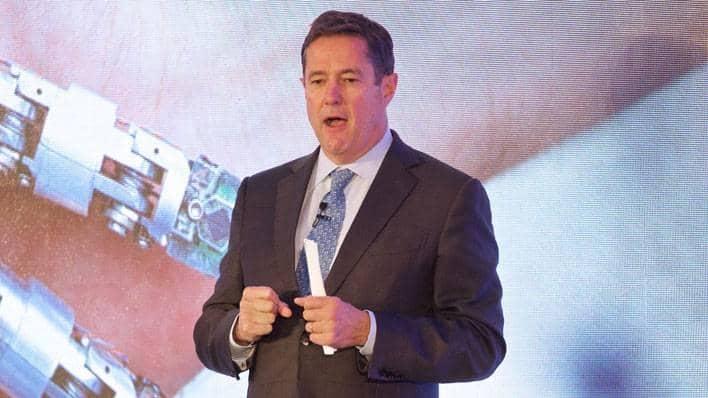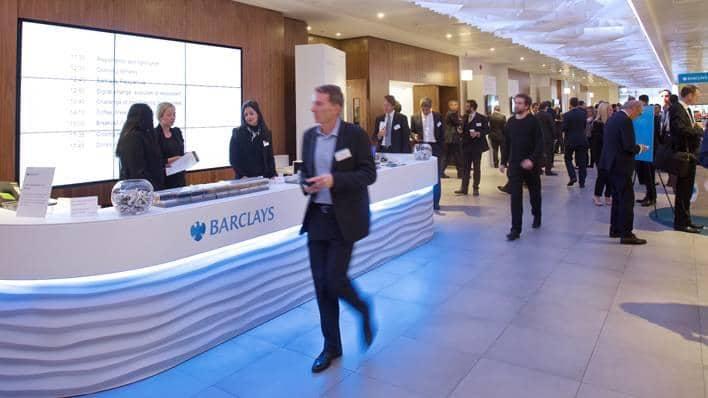
"Having the right technology in place is a critical obligation for Barclays"
The bank’s Group Chief Executive, Jes Staley, looked at the vital relationship between banking and technology in a speech at the Barclays Digital Conference 2016.

As leading figures in banking and technology shared their views on the future of finance, we were there to capture some of the thought-provoking highlights from the day.
The 2016 Barclays Digital Conference brought together, investors, inventors, technologists, entrepreneurs, academics and bankers to discuss the fast-changing digital landscape. Here are eight insights and ideas from the key speakers:
1. Every business is a technology business
Two nuggets of information delivered by conference panellists: in percentage terms, Barclays employs more software developers than Google; and a basic Ford has 15 million lines of software while an iPhone has five million. In other words, digital is everywhere and traditional businesses need to think about artificial intelligence, machine learning and digital psychology as well as cybersecurity and systems.
As Matt Brittin, boss of Google Europe, put it: “Every business is a technology business, because every consumer has technology in their pocket.” Jes Staley, Group Chief Executive of Barclays, said he considers the bank in some ways: “a technology company with a balance sheet and regulators”.
2. The way we do business is realigning
The changes technology delivers are transforming business models, said Ashok Vaswani, CEO of Barclays UK. “Technology should not be thought of as a way of digitising or automating processes,” he told delegates. “But in terms of living in a connected world, where we have to think about things in a different way, organisational mindsets need to be completely shifted.”
Traditional lines between customer, client, vendor, partner and competitor are blurring. “Large corporates could be a customer and a client, while in a different part of our business they’re a competitor or a supplier,” said Vaswani. The need to deal with the same company under these different circumstances is being increased by digital.
3. The pace of change will accelerate
Digital progress over the past decade has been immense, with extraordinary effects on businesses and consumers. But the next decade has the potential to make that era look static. Ashok Vaswani told delegates “this year, for all we’ve gone through, it’s going to be the slowest period of change we’ll see over the next decade”. Matt Brittin agreed, saying that the current pace of change is slower than it will be for the rest of our lives. “Over the next five years you’ll see an even bigger shift in technology and a huge change of pace.”
4. Banking tech is central to the economy
Banks are vital to the wider economy, which means banking tech is vital to the wider economy –which means banking tech has got to work. Jes Staley said that approximately 30% of the UK’s GDP goes through Barclays' payment systems every day. “Having the right technology in place is a critical obligation for Barclays to the UK. Our back office system has to function if the nation’s economy is to function.”
5. AI is like a new life form
“In the next five years, between Artificial Intelligence (AI) and blockchain, we will see profound changes in business models, changes that will lead to the demise of some companies,” said Clara Durodié, founder of Cognitive Finance Group. “AI is like a new life form. Without understanding it, we won’t be able to get the best out of it.” Durodié added that: “In financial services, we need AI to put customers first in what we do and to put ‘services’ back in financial services. Some of us have lost track of what defines us as a sector, but, as stewards of our clients’ money, we have to understand that relationship and develop trust. I believe AI is the way to do this. AI is a strategic capability, a decision-making tool that sharpens our thinking, increases our productivity and enables us to offer a truly personalised service to our clients."
6. Ambition works
Several speakers touched on the potential benefits of seed investment and start-up accelerators for large companies. But ambition can also pay dividends within a company’s talent development scheme: “Being willing to innovate has to be underpinned by a shared sense of purpose,” said Axelle Sznajer, fintech segment lead at Egon Zehnder.
7. Tech deals with people, not “users”
Experts taking part in a panel discussion on digital psychology reminded delegates that human faces appear at the end of digital processes. Pete Trainor, author and founder of Nexus Design, rejected the word “user”, preferring to categorise those taking advantage of technology as “humans”. “We're not digitising behaviour, we're behaving in a digital world,” he said. Greg Davies, the architect of Barclays behavioural profiling tools, stressed tech is a way to figure out the human problems a company is trying to solve.
Trainor added that “people like my mother hear about AI and are worried they won’t be talking to a human being at a bank branch. We need to tell her that’s not what AI means. It means fixing the things we do badly.”
8. You can’t predict the future
Amit Pau, MD of Ariadne Capital, offered a corrective to futurologists, remembering that in 1993 AT&T hired a leading strategic consultancy to investigate the feasibility of cellular devices. They concluded the entire potential market in the US would be 100,000 by 1999. “I’m not sure you can predict the future when you have a big disruptive play. And, if you are looking to predict the future, don’t go out and recruit one of the traditional consulting firms.”

The bank’s Group Chief Executive, Jes Staley, looked at the vital relationship between banking and technology in a speech at the Barclays Digital Conference 2016.

The third annual Barclays conference devoted to developments in digital saw more than 300 people gather in London to hear industry leaders speak on a range of topics from Artificial Intelligence (AI) to cybersecurity.